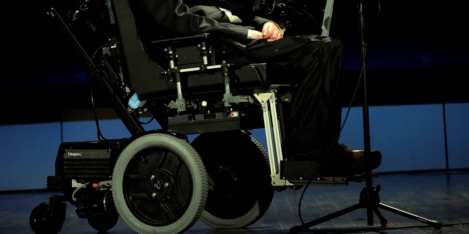March 23, 2018
Search Results for: health
March 22, 2018
Activity and a positive attitude are best treatments for back pain, claims major new study
by Mark Eltringham • News, Wellbeing
 Although lower back pain is the leading cause of disability worldwide, affecting an estimated 540 million people at any one time, it is often mistreated, according to a new series of papers in The Lancet medical journal. The series provides evidence that back pain should be managed with activity, in the workplace and in primary care. However, a high proportion of patients worldwide are treated in emergency departments, encouraged to rest and stop work, are referred for scans and surgery or prescribed pain killers including opioids. The authors claim this is at best pointless and at worst harmful. Exercise and psychological therapy are the only things that work for the majority of cases of chronic back pain but too many people wrongly believe the idea that rest is best for the condition, according to the authors. The series of papers also concludes that job satisfaction and a positive attitude are among the strongest indicators of how well people will overcome chronic back pain and related issues.
Although lower back pain is the leading cause of disability worldwide, affecting an estimated 540 million people at any one time, it is often mistreated, according to a new series of papers in The Lancet medical journal. The series provides evidence that back pain should be managed with activity, in the workplace and in primary care. However, a high proportion of patients worldwide are treated in emergency departments, encouraged to rest and stop work, are referred for scans and surgery or prescribed pain killers including opioids. The authors claim this is at best pointless and at worst harmful. Exercise and psychological therapy are the only things that work for the majority of cases of chronic back pain but too many people wrongly believe the idea that rest is best for the condition, according to the authors. The series of papers also concludes that job satisfaction and a positive attitude are among the strongest indicators of how well people will overcome chronic back pain and related issues.
March 22, 2018
More than a third of workers say lack of natural light affects their performance
by Sara Bean • Facilities management, Lighting, News, Wellbeing
 Over a third of workers are adversely affected by a lack of natural light in their office, others complain that the lighting is too bright and a significant proportion say the quality of light provided is so weak they struggle to read. This is according to a new poll which quizzed employees about the difficulties associated with workplace lighting and found that headaches and dizziness were a problem for one in seven. Other employees reported finding the lighting too bright and dazzling (12.4 percent), while one in 10 said they had to strain their eyes due to a general lack of light. A similar proportion said they were bothered by the position of the lights and by the ‘stressful environment’ created by their workplace lighting (9.3 percent each). The findings come as reports of ‘sick building syndrome’ — a condition associated with office work that causes symptoms including headaches and respiratory problems — continue to hit the headlines. Such symptoms are usually attributed to unhealthy or stressful elements of the working environment, such as poor ventilation and lighting.
Over a third of workers are adversely affected by a lack of natural light in their office, others complain that the lighting is too bright and a significant proportion say the quality of light provided is so weak they struggle to read. This is according to a new poll which quizzed employees about the difficulties associated with workplace lighting and found that headaches and dizziness were a problem for one in seven. Other employees reported finding the lighting too bright and dazzling (12.4 percent), while one in 10 said they had to strain their eyes due to a general lack of light. A similar proportion said they were bothered by the position of the lights and by the ‘stressful environment’ created by their workplace lighting (9.3 percent each). The findings come as reports of ‘sick building syndrome’ — a condition associated with office work that causes symptoms including headaches and respiratory problems — continue to hit the headlines. Such symptoms are usually attributed to unhealthy or stressful elements of the working environment, such as poor ventilation and lighting.
March 20, 2018
Many businesses doing little or nothing to alleviate workplace stress
by Neil Franklin • News
 New research by Perkbox claims that almost half (45 percent) of UK businesses do nothing to help alleviate workers’ stress, putting themselves in danger of having their workforces reach total burnout. This is despite work being the cited as the most common cause of stress (for 59 percent) and in light of 1 in 4 (25 percent) struggling to be as productive at work when stressed. What’s more 1 in 10 will call in sick and 7 percent will look for a new job. Businesses within the hospitality industry are the least likely to provide any kind of guidance or aid to help employees deal with workplace stress (64 percent), followed by the leisure sector (63 percent) and transport industry (55 percent).
New research by Perkbox claims that almost half (45 percent) of UK businesses do nothing to help alleviate workers’ stress, putting themselves in danger of having their workforces reach total burnout. This is despite work being the cited as the most common cause of stress (for 59 percent) and in light of 1 in 4 (25 percent) struggling to be as productive at work when stressed. What’s more 1 in 10 will call in sick and 7 percent will look for a new job. Businesses within the hospitality industry are the least likely to provide any kind of guidance or aid to help employees deal with workplace stress (64 percent), followed by the leisure sector (63 percent) and transport industry (55 percent).
March 16, 2018
Full fibre broadband could deliver £120bn boost to UK economy
by Neil Franklin • News, Technology
 A new study conducted by economic consultancy Regeneris, and commissioned by Cityfibre, claims that the total economic impact of deploying full fibre ultrafast broadband networks across 100 UK city and towns, could reach £120bn over a 15 year period. The study examined ten areas of the UK economy likely to benefit from full fibre roll-outs. It also sought to quantify the impact of each of these areas in 100 distinct UK town and city economies over a 15-year period. According to the researchers, the UK’s business community – and most particularly its small and medium sized companies – could stand to benefit enormously. Access to full fibre could unlock £4.5bn in business productivity, innovation and access to new markets in these locations; a further £2.3bn in growth could be driven from catalysing new business start-ups; while the increased ability for companies to support flexible working could add £1.9bn.
A new study conducted by economic consultancy Regeneris, and commissioned by Cityfibre, claims that the total economic impact of deploying full fibre ultrafast broadband networks across 100 UK city and towns, could reach £120bn over a 15 year period. The study examined ten areas of the UK economy likely to benefit from full fibre roll-outs. It also sought to quantify the impact of each of these areas in 100 distinct UK town and city economies over a 15-year period. According to the researchers, the UK’s business community – and most particularly its small and medium sized companies – could stand to benefit enormously. Access to full fibre could unlock £4.5bn in business productivity, innovation and access to new markets in these locations; a further £2.3bn in growth could be driven from catalysing new business start-ups; while the increased ability for companies to support flexible working could add £1.9bn.
March 16, 2018
Seven of the best stories about life, the universe and everything we’ve seen over the past week
by Mark Eltringham • Features, Technology, Wellbeing, Workplace design
 People don’t actually know themselves very well
People don’t actually know themselves very well
Some actual facts about the time we spend sitting at work
German workers: satisfied, but not engaged
What skills and behaviours make a good leader effective?
Stephen Hawking’s most dire predictions for the future
The World’s happiest nations, according to the UN
A critique of the dogma of wellbeing
Image: By NASA/Paul Alers [Public domain], via Wikimedia Commons
March 15, 2018
Smart cities could give people back 125 hours each year, claims new Intel study
by Mark Eltringham • Cities, News, Technology
An Intel-sponsored study by Juniper Research estimates that smart cities have the potential to “give back” around 125 hours to every resident every year. The study also ranks the top 20 smart cities worldwide across four key areas: mobility, health care, public safety and productivity, and reveals how these cities deliver positive outcomes for increased time savings and productivity, increases in health and overall quality of life, and a safer environment. The study found that Chicago, London, New York, San Francisco and Singapore (pictured), are the world’s leading cities integrating IoT technologies and connected services. These cities stand out because of their cohesive efforts to connect city municipalities, businesses and their citizens to address a growing need to improve “livability” – specifically around mobility (San Francisco and Singapore), public safety (Chicago, New York and Singapore), health care (London and Singapore), and productivity (Chicago, London and Singapore) – as they transition to a smarter, more connected environment.
March 15, 2018
Future cityscape will feature driverless transport, smart buildings and co-working says JLL
by Sara Bean • Cities, Facilities management, News, Property

Wi-Fi trees, driverless transport, smart buildings and co-working will be commonplace in 2040 predicts a report (registration required) published by JLL that outlines the ideal cityscape by 2040. The report incorporates a transformation framework aimed at enabling real estate businesses to adapt and thrive in a future city. According to the report, “The Transformation Framework”, the ideal cityscape in 2040 will have adapted to the trends driving the real estate sector over the next 20 years and will include co-working and living space, smart and healthy buildings, Wi-Fi trees, reverse vending machines, driverless transport and multi-generational housing as standard. To create the future cityscape, JLL asked some of the UK’s leading real-estate owners, occupiers, developers and investors what they thought the ideal city would look like in 2040, while taking into account the seven trends that JLL predict will influence real estate and infrastructure globally over the next two decades. These trends included tech innovation, urbanisation, land & resource scarcity, the low carbon economy, demographic & workplace change, health & wellness and transparency & social value.
March 14, 2018
Four UK cities ranked in Europe’s top ten most attractive locations for businesses and employees
by Mark Eltringham • Cities, News
 London has been ranked as Europe’s most attractive city for businesses and employees for second year running according to Colliers International’s latest European Cities of Influence report, which reviews and ranks cities based on their occupier attractiveness, availability of talent, and quality of life factors alongside economic output and productivity; Paris, Madrid, Moscow and Birmingham making up the rest of the top five. The report claims that the UK remains a highly desirable destination for capital and occupiers, largely driven by its ‘magnetism as a centre of diverse high-quality service sector talent’, which is in turn is helping to drive economic output and productivity. Other UK cities which score in the top 10 include Birmingham (5th), Edinburgh (7th) and Manchester (10th).
London has been ranked as Europe’s most attractive city for businesses and employees for second year running according to Colliers International’s latest European Cities of Influence report, which reviews and ranks cities based on their occupier attractiveness, availability of talent, and quality of life factors alongside economic output and productivity; Paris, Madrid, Moscow and Birmingham making up the rest of the top five. The report claims that the UK remains a highly desirable destination for capital and occupiers, largely driven by its ‘magnetism as a centre of diverse high-quality service sector talent’, which is in turn is helping to drive economic output and productivity. Other UK cities which score in the top 10 include Birmingham (5th), Edinburgh (7th) and Manchester (10th).
March 7, 2018
Europe continues to attract high levels of commercial property investment
by Mark Eltringham • News, Property
 Research released by Knight Frank in the European Quarterly, Commercial Property Outlook (Q3 2017) highlighted how 2017 European investment volumes were on course to beat those of 2016. In fact, a total of €47.4 billion was invested in European commercial property in the third quarter (Q3) 2017; a 13 percent increase on the same quarter of 2016. A new report from commercial property firm Savoystewart.co.uk claims to uncover the countries attracting the most interest in investment in Europe. In analysing the figures, Savoystewart.co.uk found several countries experienced a spike in commercial investment in 2017. Most notably in Finland, with a total investment of €5.6 billion, Q1-Q3 – a rise of 121.60 percent on figures from 2016. Hungary (89.90 percent), Romania (73.50 percent), the Czech Republic (43.30 percent) and Netherlands (41.70 percent) followed, with considerable increases measured.
Research released by Knight Frank in the European Quarterly, Commercial Property Outlook (Q3 2017) highlighted how 2017 European investment volumes were on course to beat those of 2016. In fact, a total of €47.4 billion was invested in European commercial property in the third quarter (Q3) 2017; a 13 percent increase on the same quarter of 2016. A new report from commercial property firm Savoystewart.co.uk claims to uncover the countries attracting the most interest in investment in Europe. In analysing the figures, Savoystewart.co.uk found several countries experienced a spike in commercial investment in 2017. Most notably in Finland, with a total investment of €5.6 billion, Q1-Q3 – a rise of 121.60 percent on figures from 2016. Hungary (89.90 percent), Romania (73.50 percent), the Czech Republic (43.30 percent) and Netherlands (41.70 percent) followed, with considerable increases measured.
March 2, 2018
Productivity, retention and employee wellbeing improve when there is workplace trust
by Sara Bean • News, Wellbeing, Workplace

Being in a reliable work environment increases retention, productivity and employee wellbeing, while also promoting a better business culture, finds new research from Bupa. An examination of workplace trust and the impact on employee wellbeing reveals that over half (53 per cent) of employees considered it to be a major factor in whether they stayed or left a company. The research found that nearly a quarter of UK employees (24 per cent) have left their company due to issues around trust. Although trust is not a tangible workplace benefits, such as salary and bonuses, it is an essential variable in promoting harmony and productivity within an organisation and the study suggests how important it is within the workplace, and also the contribution it makes to the wellbeing of employees and the overall performance of a company. The study also asked employees how trust compares to other company benefits. Nearly two thirds (62 per cent) believe that trust is more important than a gym membership or company mobile, while over half value it more than a free canteen (56 per cent) and company car (55 per cent).
























March 20, 2018
Enter the MIPIM bandwagon, towed by pink elephants
by Anna King • Comment, Property, Technology
(more…)